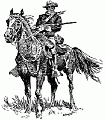
Originally Posted by
TT

There is a reasonably substantial literature that focuses on what I would call ‘change in military organizations’.
But a first question that needs to be asked is what do you mean by ‘adaptation’?
I know, I know, a picky semantic question but important nonetheless. ‘Adaptation’ has many meanings in this literature, which does lend to a degree of confusion about what is being discussed/analyzed. ‘Innovation’ is the other widely used term that often lacks semantic clarity.
To give you a starting point, some authors define ‘innovation’ (as in military innovation) as major change in the aims, strategies (ie warfighitng concepts) and/or structure of a military organization’. The emphasis here is on ‘major’. So, as an example, the adoption of the warfighting concept of maneuver warfare by the US Army and Marine Corps would be innovation in this schema.
Adaptation would, in contrast, be minor changes or alterations that improve (or not, as the case may be) something that the military does but that does not have significant.major implications for aims, strategies and/or structure. Hence adaptation covers a wide range of adjustments that military organizations and military organizations constantly undertake. As some examples, developing new foot patrol techniques would be adaptation; equally, the Army’s FCS as it was originally conceived be would be adaptation - to my mind but I am still working on this - for ultimately while the FCS entails the wholesale rethinking of the character of the platforms the Army uses, it was still be to based on a ‘division’ structure, the new platforms would do pretty much what the old ones did, only differently, and it would be used for the much the same purpose as traditional heavy armour divisions were to be used (to fight a peer on a conventional battlefield). So adaptations can small or large.
The foregoing is probably more confusing than enlightening (typically academic, then), but it does get at some of the distinctions. But the extant literature is substantial enough that even this somewhat rough and ready semantic nit-picking helps to distinguish what is of interest to you.
Also, of course, are you interested in organizational adaptation (or adaptability) or individual adaptability?
And if there is some 19th Century German military thinker who has dealt with this, I would be keen to know about him or her as well – though preferably with the reference to an English version. My Deutsche is pretty restricted to ordering a large beer, asking where the bathroom is and saying ‘thank you and ‘please’ …..












Bookmarks